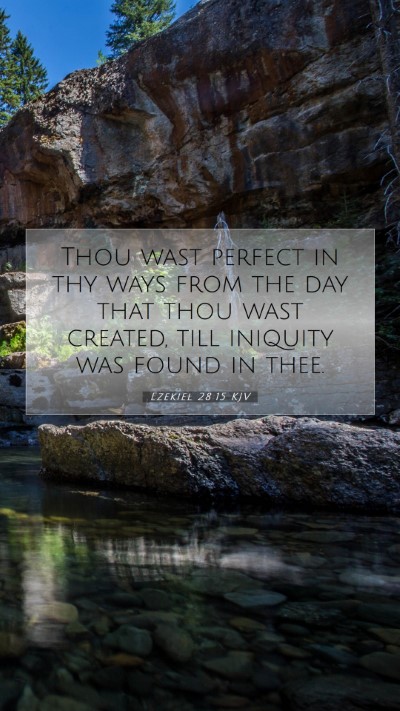Ezekiel 28:15 Explained: A Detailed Commentary
Bible Verse: Ezekiel 28:15 - "Thou wast perfect in thy ways from the day that thou wast created, till iniquity was found in thee."
Ezekiel 28:15 serves as a profound exploration of the nature of evil and the fall from grace. In this verse, the prophet Ezekiel describes the state of perfection that characterized a being before moral failure led to its current state of condemnation. In examining this verse, we can draw from various public domain commentaries to deepen our Bible verse interpretations and Bible verse explanations.
Contextual Understanding
The chapter provides insight into the pride and subsequent fall of a figure often interpreted as a representation of the King of Tyre, which also bears a deeper theological significance often linked to Satan.
Commentary Insights
- Matthew Henry: Henry emphasizes that the verse depicts the original state of purity and righteousness in which God created His beings. The passage highlights that the fall is not merely a transition from good to bad, but the emergence of iniquity that was not part of God's original design.
- Albert Barnes: Barnes reflects on the word "perfect", suggesting that it indicates completeness in moral qualities before rebellion. He warns of the consequences of pride and the inevitable downfall that followed the being’s initial state of grace, stressing the importance of maintaining humility.
- Adam Clarke: Clarke elaborates on "iniquity was found in thee," suggesting that this refers to a deliberate turning away from divine purpose. He mentions how this iniquity represents the idea of self-exaltation which ultimately leads to destruction.
Theological Implications
This verse is of critical importance in understanding the meaning of Bible verses that deal with temptation, pride, and moral failure. The transition from creation's perfection to the existence of evil is a theme that resonates through Scripture, providing a backdrop for Biblical exegesis and scripture analysis.
The implications of Ezekiel 28:15 challenge readers to contemplate the nature of evil in the world and the origins of sin as a deviation from God's good creation. It also reflects the transformative journey from being created in God's image towards a state of spiritual death through rebellion.
Cross References
- Isaiah 14:12-15: A parallel passage that discusses the fall of Lucifer, drawing similarities in the themes of pride and judgment.
- Genesis 1:31: God's creation is described as "very good", setting a baseline for the perfection that was later marred by sin.
- Revelation 12:7-9: This passage depicts the ultimate spiritual battle where Satan falls from heaven, reinforcing the narrative of evil's origin and rebellion against God.
Applications for Life
Understanding Ezekiel 28:15 is not just about historical exegesis or theological debate; it has real-world implications for believers today. The verse invites reflection on personal integrity, the dangers of pride, and the reality of spiritual warfare.
Practical Reflection:
- How Cultivating Humility: As highlighted by Matthew Henry, maintain a humble view of self in light of God's creation and intentions.
- Recognize Moral Lapses: Staying vigilant against iniquities that may quietly infiltrate our lives, as warned by the insights from Barnes.
- Confronting Sin: Acknowledge that sin often begins as an inward struggle like that described in Clarke's observations.
Final Thoughts
The exploration of Ezekiel 28:15 provides an essential Bible study insight into the nature of humanity's fall and the characteristics of evil. Through a blend of Bible verse commentary and theological reflection, we comprehend the significance of purity, pride, and the consequences of turning away from God's intended path.
As we study this verse, we arm ourselves with knowledge pertinent to understanding both the Scriptures and our own spiritual journeys. Seeking wisdom through various Bible study resources enriches our comprehension of such profound biblical truths.


